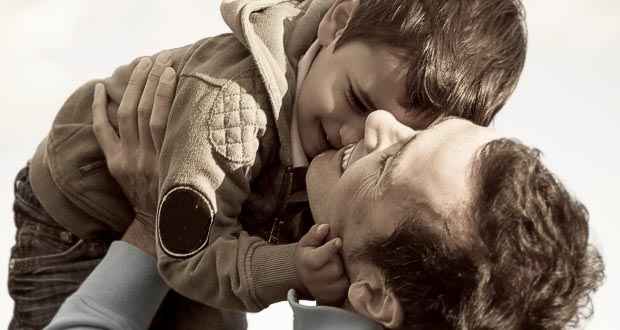As a home-schooling father of eight children, I have been asked to do a regular column on Catholic fatherhood in this newsletter, and specifically, Catholic fatherhood in the home schooling family. Being a financial professional who has assisted Catholic fathers with their family finances for well over a decade, and having given a number of motivational speeches to fathers at Catholic conferences, I have listened to the concerns of hundreds of Catholic fathers. These conversations have helped me arrive at a simple conclusion: the relevance of fatherhood in our society has never been greater, but simultaneously, it has never been more lacking.
In a culture that doesn’t know how to, and/or refuses to, define the word “family”, the role of a father has become seemingly insignificant, which has aggravated the problem.
Considering its importance, very little is currently being written on the subject of Catholic fatherhood. Recently, I went to Amazon.com and did a search for the word “fatherhood”, and a tagline appeared that read: “Did you mean motherhood?”
Not a good sign.
I then did a search on Amazon.com for “Catholic fatherhood”. This produced 270 results. To establish comparative data, I typed in some other searches at random, and here are those results:
- “Panda bears”: 1,914 results
- “Black holes”: 46,951 results
- “Applied Linear Algebra”: 1,706 results
- “The number zero”: 22,671 results
- “Welding theory”: 284 results
- “Brazilian ecosystems”: 153 results
This comparative lack of writing on the topic of Catholic fatherhood leads to one of three possibilities: first, that fatherhood is irrelevant, and welding theory is actually more important; second, that fatherhood is so natural to all fathers that nothing need be written about it, or; third, that the idea of bettering oneself at fatherhood is inherently unknowable, and therefore, nothing can be written about it. Since a man can perform acts that more or less pertain to his children’s welfare, the second and third possibilities seem impossible. The sad fact is that our society views fatherhood as almost irrelevant (at least in relation to welding).
In reality, however, fatherhood is critical, and one need not have a religious perspective to recognize this. As the authors of The Unexpected Legacy of Divorce write:
“After decades of minutely recording mother-child interactions as if they existed in a ‘daddy-less’ world, researchers have finally discovered fathers and how important they are to a child’s development. Today’s answers to the question: ‘What good are fathers?’ would fill a small library. Children with sensitive, involved fathers surge ahead in their cognitive and social development as they explore their environment and play with other children…And just to dispel the strange notion that fathers are more important to their sons than to their daughters, a study of young women who excelled in their academic studies at Stanford and Berkeley revealed they attributed their high ambition to their father’s long-standing encouragement. I found that women who maintain a passionate relationship with their husbands throughout many years of the marriage had a healthy, loving relationship with their fathers as children.”
One of the things that you, as a Catholic father must understand is that your role, far from inconsequential, is a major determinant for the entire lives of your children. There is a mountain of sociological and psychological evidence to support the claim that boys grow up either wanting to be exactly like their fathers or exactly unlike them, and girls try to find a man just like (or just unlike) their father to marry. For perhaps the most important stage of their development, boys and girls look at their fathers and say to themselves: “This is what men are like.” Obviously, this can have positive or negative repercussions. But there is a deeper, even more important reality—children look at their fathers and say to themselves: “This is what God is like.”
Pope Benedict XVI examines this subject in his book Jesus of Nazareth. The Holy Father writes that the ability to call God “Father” is in itself an indescribable joy and great consolation. But then the Holy Father laments that, for many, the ability to call God “Father” is not a consolation, because it references a damaged or non-existent relationship. He writes:
“It is true, of course, that contemporary men and women have difficulty experiencing the great consolation of the word father immediately, since the experience of the father is in many cases either completely absent or is obscured by inadequate examples of fatherhood.”
It is hard to overestimate the enormity of the father’s role. Rather than being insignificant, it’s significance should make us tremble, and ask God for the grace to properly fulfill our mission.
As I write these columns in the following months, I will be praying for myself, and for all Catholic home schooling fathers, that we have the grace to fulfill this mission from God—this mission to be a father. We Catholic fathers need pep talks to continue our mission in life. What I envision this series to be is sort of a literary support group.
As such, please share your thoughts, concerns, and questions with me. I don’t have this whole fatherhood thing figured out yet, so I would appreciate your input and ideas.
Since this article originally appeared in July 2008, John and Lisa Clark have welcomed a ninth child into their home.

 Seton Magazine Catholic Homeschool Articles, Advice & Resources
Seton Magazine Catholic Homeschool Articles, Advice & Resources
